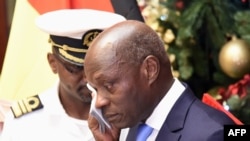Guinea-Bissau's outgoing president urged future leaders to guarantee stability Tuesday, in a tearful farewell speech made on the eve of a new president being declared in the unstable West African country.
Jose Mario Vaz, the incumbent, came to power in 2014 on hopes that he would restore normality after a coup two years prior.
His rule has been pockmarked by paralysing spats with parliament, however, in a country with a chronic history of assassinations and coups.
"We will write a new page in the history of our democracy," Vaz said during the televised speech, referring to the handover of power.
Guinea Bissau's electoral commission is due to publish the results of the second round of the country's presidential election on Wednesday morning.
Two former prime ministers who topped the first round are in the running: Domingos Simoes Pereira from the traditional ruling party, and opposition candidate Umaro Sissoco Embalo.
Vaz was knocked out in the first round after years of political gridlock triggered by his disputes with the parliament.
Speaking through tears at the end of his speech, the president urged "calm while waiting for the definitive results" and also hailed the army for keeping out of politics during his time in office.
He added that he wanted to maintain a "new era of liberty" achieved under his watch, pointing to a strengthening of freedom of expression and a decline in political violence.
Guinea-Bissau gained independence from Portugal in 1974, but has suffered a string of military coups, attempted coups and political assassinations ever since.
A small impoverished country of 1.8 million people, Latin American drug runners have exploited the instability to make Guinea-Bissau a hub along the cocaine-smuggling route to Europe.
Senior military and government figures have been implicated in the trade.
Vaz exhorted young people to fight the "small elite that wants everything for itself, and forgets workers".
He also suggested that Guinea-Bissau's semi-presidential political system - which can pit presidents against parliaments - must change in order to guarantee stability.








